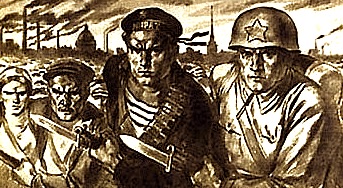Therefore any threats from Moscow, he said, engage other nations and must be viewed from a wider European perspective.
In this respect, Allik insisted, Estonian defence expenditures do not have to be at the promised 2% of Gross Domestic Product, because national defence, will only be a part of a multi-nation defence effort. Even though Allik has for years been a sharp critic of defence expenditures, its ironical that in 1991 he wrote an article in “Päevaleht” entitled “Abolish the ministry of culture! Create a ministry of defence!'. Then in 2001 he said that Estonia's accession to NATO weakens rather than enhances the country's security.
Allik's statement caused a media furor. Some critics, somewhat inappropriately, drew similarities between Allik's thoughts and those who insist that Hitler was not targeting the Jews, because Gypsies, homosexuals, the disabled, the mentally ill and others were also victims of the concentration camps.
Allik's statements infuriated many politicians and journalists, and one of the first to react was Sven Mikser (who will visit Canada in two weeks), leader of the Social democrats. “The Soviet occupation and the crimes of the Soviet regime are a painful experience and an emotional theme for Estonians. Every politician, especially an experienced one such as Jaak Allik, should thus be particularly accurate and sensitive as to the impact of provocative statements and their possible interpretations,” Mikser commented.
Defence Minister Urmas Reinsalu thought that Allik's position was similar to that of Karl Vaino, a first secretary of the Estonian communist party from the past, totally subservient to Moscow and a ‘would be' Estonian who hardly spoke the language. “Such denial of Estonia's past in the name of political gain is horrid (cozying-up to the ethnic Russian vote in the upcoming municipal elections where non-citizens have voting rights – ed.). It's a betrayal of our past and blind to the current national security risks.”
Even the Centre Party, widely known to be seeking the Russian vote, was critical of Allik's historical opinions. The Centrists claimed that Allik's stance resulted from the recent amalgamation of the Social Democrats and the Russian Party. The latter's leaders are known for their previous Moscow-oriented positions on historical issues.
Others pointed out that from the12th century on Russian attacks against Estonia have been well documented. During the Livonian and Northern wars, Estonian losses were so severe that extinction of the population was a realistic possibility. The War of Independence of 1918-1920 was a conflict between Russia and Estonia and the fact that Russia was also at war on other fronts did not diminish the fact that Russia's goal was to regain Estonia under its empire. In 1940 it was clear that Russian was the aggressor, illegally occupying and annexing Estonia.
However, the few pro-Allik observers insisted that Russia did not attack in 1940 but simply occupied and annexed Estonia according to the Molotov-Ribbentrop Pact between the Soviet Union and Nazi Germany in 1939. Such logic would then accept that Estonia has simply been the victim of the machinations of, and the military confrontations between Europe's larger powers. Russia has often declared that its occupation of Estonia was a ‘justified' defensive move and that this ‘larger' goal had more urgency and importance than Estonia's freedom.
Observers also were mindful of the argument that Russia could not have attacked Estonia prior to Estonia's independence because the state, as it was established did not exist until 1918. This was dismissed as simply a matter of semantics.
Allik's critics also stated that Russia has never respected Estonia's right to choose its allies and international organizations to which it decides to belong. In addition Russia opposes the right for Estonia to administer its own citizenship policy and to publish its own version of history textbooks. This is all part of the Russian claim to a ‘near abroad', countries that previously were captured within the Soviet Bloc, territory where Moscow's influence should still dominate. This was some of the spill-over resulting from Allik's statements.
Even though Allik attempted to put his own spin on what he actually meant, he unquestionably fed the active Russian propaganda machine. Allik reaffirmed Moscow's tiresome adages that the War of Independence was simply an Estonian civil war, that the sinister Molotov-Ribbentrop Pact, the brutality of deportations and the human rights violations of the 50-year-long occupation was the fictional invention of Estonians.
Allik was minister of culture from 1995-1999, and has changed parties from the Communists, to the Coalition Party, to the People's Federation, to now the Social Democrats. One can ask why he doesn't realize that pragmatic and friendly relations with Russia are meaningless if the price is Estonia discarding its basic values and adopting a bizarre interpretation of its past? What we are forced to give up changes who we actually are.
Laas Leivat




